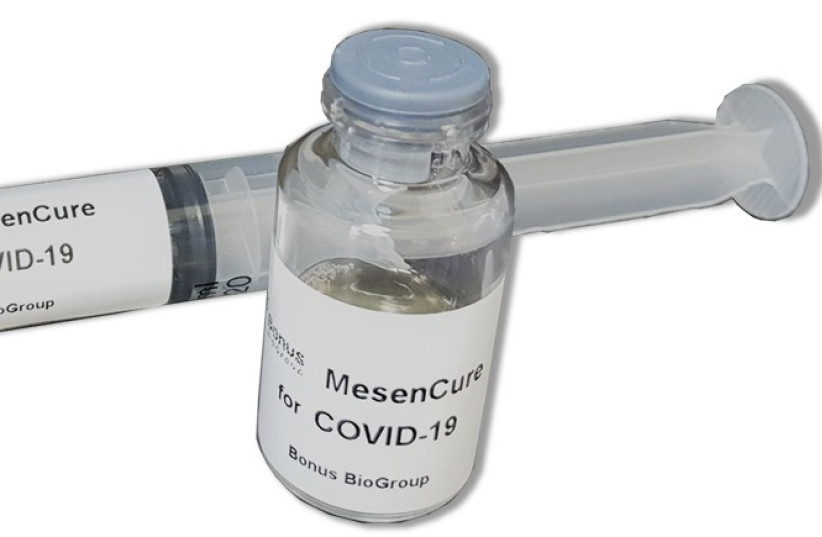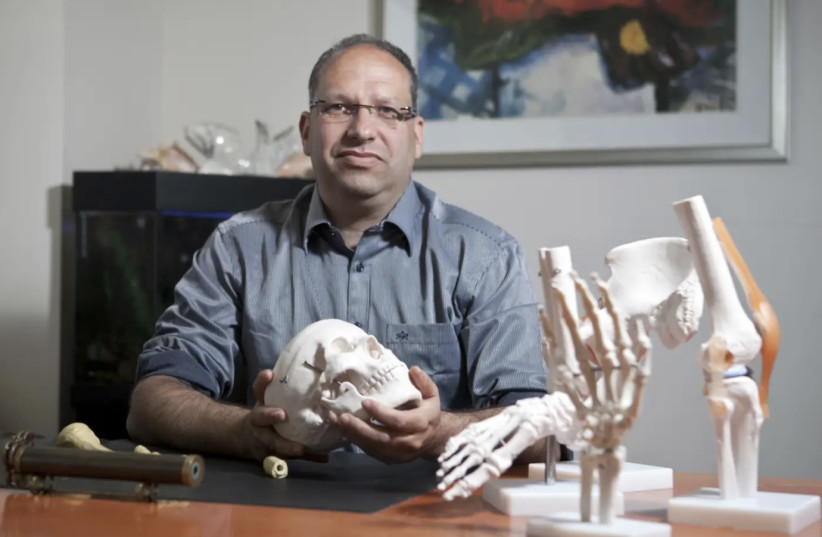Bonus BioGroup CEO says company now aiming for emergency use authorization in US, EU and Israel.

An Israeli treatment for severe COVID-19 has been found to reduce mortality by 70% in a Phase II clinical trial conducted at three major hospitals throughout the country.
Bonus BioGroup released new data this week showing that the 30-days survival rate of 50 severely ill hospitalized patients with oxygen saturation of 93% and below and diffuse pneumonia who received up to three doses of the company’s MesenCure treatment was 94% – meaning 47 out of 50 patients survived.
When comparing the first 30 patients in the trial to 60 similar patients who were used as control group, the outcome is even more striking: only 6.7% of the patients treated with MesenCure died due to COVID-19 or its complications, compared to 23.3% of the control group.
“The results are better than we expected,” said company CEO Dr. Shai Meretzki. “We expected good results, but not such good results compared to the control group.”
Vaccination can be used to prevent coronavirus. New drugs by Merck and Pfizer are showing the likelihood of success for treating mild patients in the early stages of the disease. But there is not yet a drug available to help save the lives of the most severe COVID patients.

Pneumonia and cytokine storms leading to respiratory distress are a common complication of COVID-19, caused by the excessive accumulation of white blood cells and fluid in the lungs.
MesenCure is a cell therapy consisting of millions of living cells packed into and delivered with each dose. MesenCure consists of activated Mesenchymal Stromal Cells (MSCs) that are isolated from the adipose tissue of healthy donors; a minimum of 45,000 doses can be produced from a single lipoaspirate donor following cell expansion and enhancement.
The cells are infused into a sick person and, on infusion, the living cells ride the blood stream until they reach the lungs. When they sense inflammation, MesenCure cells start secreting anti-inflammatory and regenerative factors. These factors reduce the activation of inflammatory cells and the cytokine storm and prevent inflammatory cells from further accumulating in the lungs. They also encourage the clearance of the white blood cells and support tissue regeneration.
Once the inflammation has been soothed and the excess fluid has been cleared from the lungs, respiratory distress gets better.
The Phase II trial, as noted, included 50 patients all defined as severe. Most of them also had some underlying medical condition that would make them more prone to death from COVID, such as diabetes, obesity, excess lipids in the blood or hypertension, explained Bonus BioGroup’s Head of Research Dr. Tomer Bronshtein.
Patients were between the ages of 41 and 77. Each one was matched with two severe patients with similar characteristics of sex, age and comorbidities who met the inclusion criteria of the clinical trial although they only received the best standard of care according to their condition and not MesenCure.
The trial took place at Rambam Health Care Campus, Kaplan Medical Center and Baruch Padeh Medical Center.
Beyond the mortality results, MesenCure was also found to shorten the hospitalization period of the treated patients by 45% from an average of 17.2 days to only 9.4 days – a difference of eight days.
About half of the severe patients treated with MesenCure were discharged from the hospital up to just one day after the end of treatment, more than a third of patients were discharged from the hospital on the day their treatment ended, and more than 60% of them were discharged up to two days after treatment.
Bronshtein said that about a third of the patients who were let go on the day treatment ended could have been let go even before receiving the third and last dose but simply remained in the hospital to complete the trial. This means, he explained, that in real-world conditions, the reduction of hospitalization days is likely even more.
“By freeing up intensive care unit beds doctors will be able to provide better care to other patients,” Bronshtein said.
He added that the first patient to be dosed with MesenCure, a 73-year-old woman, recovered so quickly after receiving just one dose of the treatment that doctors called the company to report that she was off the bed and exercising the next day.
“This was a very encouraging beginning for us,” he said, adding that accelerated healing will likely mean less risk for developing long COVID and other COVID-related disabilities.
Based on these results, Meretzki said he is hopeful that soon Bonus BioGroup will be able to treat a lot more patients not only in Israel but in other parts of the world. He said the company is preparing the data to submit to regulators in the United States and Europe.
“We hope now we have results that are good enough for emergency approval,” Meretzki said.
The data is also being prepared now for peer-review by a major scientific journal. The Health Ministry has already received the data and it has been reviewed by an external board of experts as required.
“People are dying,” Meretzki said. “We believe we can save the lives of the majority of them.”
As reported by The Jerusalem Post
